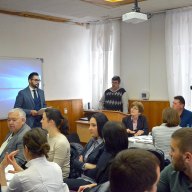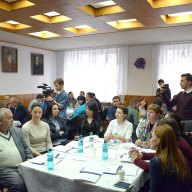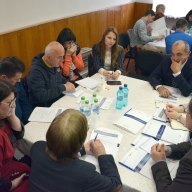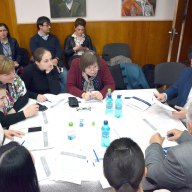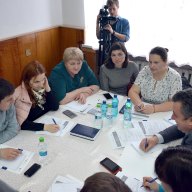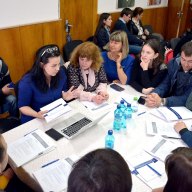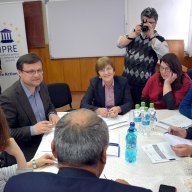Citizens of Taraclia discuss interethnic relations and social cohesion in Moldova
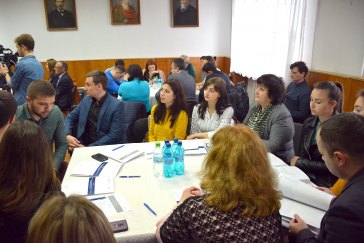
On 12 April 2019 the Institut für Europäische Politik in cooperation with our Moldovan partners, the Institute for European Policies and Reforms (IPRE) and the Institute for Strategic Initiatives (IPIS) organised a local dialogue workshop in Taraclia, the capital of the correspondent rayon mostly inhabited by ethnic Bulgarians. The event was attended by around 40 participants from civil society, associations of ethnic minorities, media, as well as local and national authorities in Moldova, which jointly discussed the issue of interethnic relations and social cohesion in the country.
The participants were welcomed by the project partners, the Dean of the Taraclia State University, which kindly hosted the event, and the mayor of Taraclia, Serghei Filipov. Vera Petuhov, Deputy Director of the Agency for Interethnic Relations, presented the main efforts of her institution to promote inter-ethnic dialogue and voiced her support for the project and this kind of event to support social cohesion in the country.
The participants were invited to discuss the main challenges regarding interethnic relations and social cohesion as well as potential solutions in a World Café format along four thematic areas: education and mass media, economic development, social rights, and the Association Agreement with the European Union. With regard to the media, which often report in the state language and or thus inaccessible for certain ethnic minority groups, the participants called for increased financial support to local media outlets reporting in minority languages and for introducing subtitles for national programmes. In the field of economic, development the need for a better promotion of the already existing business incubators in Taraclia was stressed along with the suggestion to build capacities among local authorities in project writing and project management to foster economic development of the region. With regard to public services, some participants raised the issue of rigid regional jurisdictions irrespective of geographic realities, especially in the health sector, complicating the utilisation of public services for citizens of certain regions, and thus called for increased inter-district cooperation on these matters. In order to prevent a polarising public discourse on Moldova’s association process with the European Union, the necessity of a more targeted information campaign in the region was discussed and the idea to open a EU information center in Taraclia was put forward.
The ideas and solutions raised during this workshop and previous project activities will be picked up and further discussed in the upcoming project events – such as an interregional dialogue, a policy debate and a public conference, in order to elaborate interethnically concerted recommendations to improve social cohesion in Moldova.
The event was organised in the framework of the project “Promoting civil society and interethnic dialogue in the Republic of Moldova in the context of the EU association process” (CIVID), which is kindly supported by the German Federal Foreign Office.



